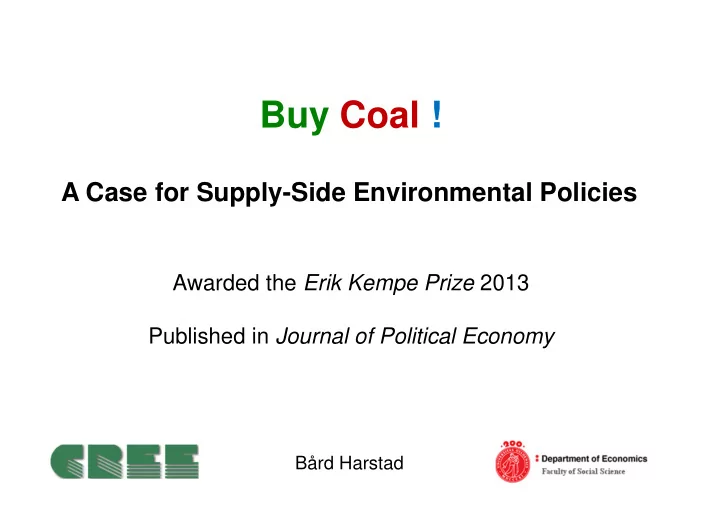

Buy Coal ! A Case for Supply-Side Environmental Policies Awarded the Erik Kempe Prize 2013 Published in Journal of Political Economy Bård Harstad
Three Numbers* I. 2 grader Celsius . Temperate-increase threshold set by international negotiators (UN) II. 565 Gigaton . Amount CO 2 we can release before 2050 to meet the temperature target III. 2795 Gigaton . Amount known resources of carbon * Bill McKibben, the Rolling Stone Magazine 19. juli 2012:
The Problem Many countries are unwilling to cooperate If only a subset of countries cooperate, the climate policy will be ineffective: Nonparticipants will consume and extract too much +Carbon leakage: If coalition consume less, fossil- fule price declines and others consume more If coalition extracts less, others extract more => Less motivation to participate Strategic policy will distort international trade Bård Harstad
A Game Bård Harstad
The Market for Fuel
The Policy Stage
Reduction of consumption price* demand* consumption* Price declines Fossil fuel consumption abroad ↑ (particularly if demand-function “flat”) Bård Harstad
Reduction of extraction price* supply* utvinning* Price increases Extraction abroad ↑ (particularly if foreign supply “price sensitive”) Bård Harstad
The Policy Stage Consume less? Price down and others consume more Extract less? Price up and others extract more Balance the two: If supply “elastic” (price sensitive) then better to consume less Climate policy affects the terms-of-trade, so a fossil-fuel importing coalition will focus on less consumption (in order to reduce global price)
Inefficiences Free-riders consume too much & extract too much Price is low => free-riders invest little in R&D Wrong types of fuel extracted Coalition’s policy distorts international trade Policy is not “time consistent” (green paradox) Not very attractive to cooperate
The market for extraction right price* supply* p c extraction* Profit is p - c Gains from buying if Damage> p-c Bård Harstad
A “secondary” effect price* supply* p c extraction* Foreign supply becomes less sensitive to the price This reduces carbon leakage on the supply side! => optimal to reduce extraction, not consumption Bård Harstad
A “secondary” effect price* supply* p c extraction* Consumption-price will be equal abroad/home This price is high, so all invest more in R&D The “ socially optimal ” solution is implemented! Bård Harstad
Literature The Coase Theorem If property rights are well-defined: Efficient Here: Enough with bilateral trade in “inputs” Peter Bohm (1993) provided an… example of when buying foreign deposit beneficial But unclear when beneficial more generally No research since… Bård Harstad
Realistic? Seen it before: REDD Market exists already Cheap: Buy only barely profitable fields Administration is easy Fear re-nationalization? Lease! Bård Harstad
Three Numbers* I. 2 grader Celsius . Temperate-increase threshold set by international negotiators (UN) II. 565 Gigaton . Amount CO 2 we can release before 2050 to meet the temperature target III. 2795 Gigaton . Amount known resources of carbon * Bill McKibben, the Rolling Stone Magazine 19. juli 2012:
Bård Harstad
Bård Harstad
Bård Harstad
SPIEGEL ONLINE: Minister Eide, do you see yourself as representing a reckless country? Eide: No, not at all. On the contrary. SPIEGEL ONLINE: An environmental committee of the British parliament recently called drilling for oil and natural gas in the Arctic a "reckless gold rush.“ Eide: The exploitation of Arctic resources will happen. The Economist: …those greens who have set their hopes on the eco- attuned Inuit or Scandinavians taking a stand against Arctic warming are likely to be disappointed. Bård Harstad
Recommend
More recommend